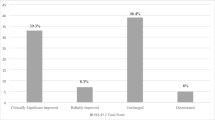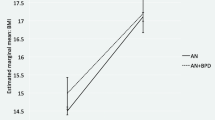Abstract
Objective: To assess improvement in aspects of personality in patients hospitalized with anorexia nervosa (AN) and its relationship to improved depression, body mass index (BMI), and eating disorder outcome after treatment. Method: Twenty females hospitalized with AN completed intake and discharge assessments of BMI, depression and eating disorder severity, as well as personality pathology with the Minnesota Multiphasic Personality Inventory (MMPI-2) and the Revised NEO Personality Inventory (NEO PI-R). Clinical outcome for a subset of patients at 1-year post-hospitalization was determined. Results: The only factor that predicted better versus worse outcome at 1-year post-hospitalization was change in Low Self-Esteem (LSE) from the MMPI-2. Improved LSE from admission to discharge predicted remission at 1-year post-hospitalization, while worsening LSE predicted relapse. Regardless of outcome, NEO PI-R Neuroticism remained pathologically elevated in AN patients during hospitalization. Discussion: Pathological levels of neuroticism may represent a vulnerability factor for AN. In contrast, self-esteem appears to be a modifiable factor that predicts outcome following hospitalization, and may be an important target for treatment.
Similar content being viewed by others
References
Birmingham C.L., Su J., Hlynsky J.A., Goldner E.M., Gao M.: The mortality rate from anorexia nervosa. Int. J. Eat. Disord., 38, 143–146, 2005.
McKenzie J.M., Joyce P.R.: Hospitalization for anorexia nervosa. Int. J. Eat. Disord., 11, 235–241, 1992.
Herzog D.B., Dorer D.J., Keel P.K., Selwyn S.E., Ekeblad E.R., Flores A.T., Greenwood D.N., Burwell R.A., Keller M.B.: Recovery and relapse in anorexia and bulimia nervosa: a 7.5-year follow-up study. J. Am. Acad. Child Adolesc. Psychiatry, 38, 829–837, 1999.
Steinhausen H.C.: The outcome of anorexia nervosa in the 20th century. Am. J. Psychiatry, 159, 1284–1293, 2002.
Deter H.C., Herzog W.: Anorexia nervosa in a longterm perspective: results of the Heidelberg-Mannheim Study. Psychosom. Med., 56, 20–27, 1994.
Morgan H.G., Russell G.F.: Value of family background and clinical features as predictors of long-term outcome in anorexia nervosa: four-year follow-up study of 41 patients. Psychol. Med., 5, 355–371, 1975.
Pike K.M.: Long-term course of anorexia nervosa Response, relapse, remission, and recovery. Clin. Psychol. Rev., 18, 447–475, 1998.
Strober M., Freeman R., Morrell W.: The long-term course of severe anorexia nervosa in adolescents: survival analysis of recovery, relapse, and outcome predictors over 10-15 years in a prospective study. Int. J. Eat. Disord., 22, 339–360, 1997.
Martin F.E.: The treatment and outcome of anorexia nervosa in adolescents: a prospective study and five year follow-up. J. Psychiatr. Res., 19, 509–514, 1985.
Rosenvinge J.H., Mouland S.O.: Outcome and prognosis of anorexia nervosa. A retrospective study of 41 subjects. Br. J. Psychiatry, 156, 92–97, 1990.
Tanaka H., Kiriike N., Nagata T., Riku K.: Outcome of severe anorexia nervosa patients receiving inpatient treatment in Japan: an 8-year follow-up study. Psychiatry Clin. Neurosci., 55, 389–96, 2001.
Holliday J., Uher R., Landau S., Collier D., Treasure J.: Personality pathology among individuals with a lifetime history of anorexia nervosa. J. Pers. Disord., 20, 417–30, 2006.
Kaye W.: Neurobiology of anorexia and bulimia nervosa. Physiol. Behav., 94, 121–35, 2008.
Lilenfeld L.R., Wonderlich S., Riso L.P., Crosby R., Mitchell J.: Eating disorders and personality: a methodological and empirical review. Clin. Psychol. Rev., 26, 299–320, 2006.
Anderluh M.B., Tchanturia K., Rabe-Hesketh S., Treasure J.: Childhood obsessive-compulsive personality traits in adult women with eating disorders: defining a broader eating disorder phenotype. Am. J. Psychiatry, 160, 242–247, 2003.
Bulik C.M., Sullivan P.F., Fear J.L., Pickering A.: Outcome of anorexia nervosa: eating attitudes, personality, and parental bonding. Int. J. Eat. Disord., 28, 139–147, 2000.
Crane A.M., Roberts M.E., Treasure J.: Are obsessivecompulsive personality traits associated with a poor outcome in anorexia nervosa? A systematic review of randomized controlled trials and naturalistic outcome studies. Int. J. Eat. Disord., 40, 581–588, 2007.
Fairburn C.G., Cooper Z., Doll H.A., Welch S.L.: Risk factors for anorexia nervosa: three integrated casecontrol comparisons. Arch. Gen. Psychiatry, 56, 468–476, 1999.
Fassino S., Piero A., Gramaglia C., Abbate-Daga G: Clinical, psychopathological and personality correlates of interoceptive awareness in anorexia nervosa, bulimia nervosa and obesity. Psychopathology, 37, 168–174, 2004.
Halmi K.A., Agras W.S., Crow S., Mitchell J., Wilson G.T., Bryson S.W., Kraemer H.C.: Predictors of treatment acceptance and completion in anorexia nervosa: implications for future study designs. Arch. Gen. Psychiatry, 62, 776–781, 2005.
Heiman N., Stallings M.C., Young S.E., Hewitt J.K.: Investigating the genetic and environmental structure of Cloninger’s personality dimensions in adolescence. Twin Res., 7, 462–470, 2004.
Jonnal A.H., Gardner C.O., Prescott C.A., Kendler K.S.: Obsessive and compulsive symptoms in a general population sample of female twins. Am. J. Med. Genet., 96, 791–796, 2000.
Tozzi F., Aggen S.H., Neale B.M., Anderson C.B., Mazzeo S.E., Neale M.C., Bulik C.M.: The structure of perfectionism: a twin study. Behav. Genet., 34, 483–494, 2004.
Bulik C.M., Slof-Op’t Landt M.C., van Furth E.F., Sullivan P.F.: The genetics of anorexia nervosa. Annu. Rev. Nutr., 27, 263–275, 2007.
Bulik C.M., Sullivan P.F., Tozzi F., Furberg H., Lichtenstein P., Pedersen N.L.: Prevalence, heritability, and prospective risk factors for anorexia nervosa. Arch. Gen. Psychiatry, 63, 305–312, 2006.
Dancyger I.F., Sunday S.R., Eckert E.D., Halmi K.A.: A comparative analysis of Minnesota Multiphasic Personality Inventory profiles of anorexia nervosa at hospital admission, discharge, and 10-year follow-up. Compr. Psychiatry, 38, 185–191, 1997.
Gundersen J.H.: Psychometric features related to the acute phase and final outcome of anorexia nervosa. Scand. J. Psychol., 30, 81–89, 1989.
Schork E.J., Eckert E.D., Halmi K.A.: The relationship between psychopathology, eating disorder diagnosis, and clinical outcome at 10-year follow-up in anorexia nervosa. Compr. Psychiatry, 35, 113–123, 1994.
Edwin D., Andersen A.E., Rosell F.: Outcome prediction by MMPI in subtypes of anorexia nervosa. Psychosomatics, 29, 273–282, 1988.
Klump K.L., Strober M., Bulik C.M., Thornton L., Johnson C., Devlin B., Fichter M.M., Halmi K.A., Kaplan A.S., Woodside D.B., Crow S., Mitchell J., Rotondo A., Keel P.K., Berrettini W.H., Plotnicov K., Pollice C., Lilenfeld L.R., Kaye W.H.: Personality characteristics of women before and after recovery from an eating disorder. Psychol. Med., 34, 1407–1418, 2004.
Srinivasagam N.M., Kaye W.H., Plotnicov K.H., Greeno C., Weltzin T.E., Rao R.: Persistent perfectionism, symmetry, and exactness after long-term recovery from anorexia nervosa. Am. J. Psychiatry, 152, 1630–1634, 1995.
Wentz E., Gillberg C., Gillberg I.C., Rastam M.: Tenyear follow-up of adolescent-onset anorexia nervosa: psychiatric disorders and overall functioning scales. J. Child Psychol. Psychiatry, 42, 613–622, 2001.
Laessle R.G., Schweiger U., Pirke K.M.: Depression as a correlate of starvation in patients with eating disorders. Biol. Psychiatry, 23, 719–725, 1988
Casper R.C.: How useful are pharmacological treatments in eating disorders?. Psychopharmacol. Bull., 36, 88–104, 2002.
Costa P.T. Jr., Bagby R.M., Herbst J.H., McCrae R.R.: Personality self-reports are concurrently reliable and valid during acute depressive episodes. J. Affect. Disord., 89, 45–55, 2005.
Claes L., Vandereycken W., Luyten P., Soenens B., Pieters G., Vertommen H.: Personality prototypes in eating disorders based on the Big Five model. J. Pers. Disord., 20, 401–416, 2006.
Podar I., Hannus A., Allik J.: Personality and affectivity characteristics associated with eating disorders: a comparison of eating disordered, weight-preoccupied, and normal samples. J. Pers. Assess., 73, 133–147, 1999.
Beato-Fernandez L., Rodriguez-Cano T.: Gender differences regarding psychopathological, family and social characteristics in adolescents with abnormal eating behavior. Eat. Behav., 6, 337–344, 2005.
Kramer M.D., Krueger R.F., Hicks B.M.: The role of internalizing and externalizing liability factors in accounting for gender differences in the prevalence of common psychopathological syndromes. Psychol. Med., 38, 51–61, 2008.
Hebebrand J., Casper R., Treasure J., Schweiger U.: The need to revise the diagnostic criteria for anorexia nervosa. J. Neural Transm., 111, 827–840, 2004.
Wilfley D.E., Bishop M.E., Wilson G.T., Agras W.S.: Classification of eating disorders: toward DSM-V. Int. J. Eat. Disord., 40 Suppl, S123–S129, 2007.
Howell D.C.: Statistical Methods for Psychology. Boston, PWS-Kent Publishing Company, 1992.
Kachele H.: [A multicenter study of expenditure and success in psychodynamic therapy of eating disorders. Study design and initial results]. Psychother. Psychosom. Med. Psychol., 49, 100–108, 1999.
Baran S.A., Weltzin T.E., Kaye W.H.: Low discharge weight and outcome in anorexia nervosa. Am. J. Psychiatry, 152, 1070–1072, 1995.
Howard W.T., Evans K.K., Quintero-Howard C.V., Bowers W.A., Andersen A.E.: Predictors of success or failure of transition to day hospital treatment for inpatients with anorexia nervosa. Am. J. Psychiatry, 156, 1697–1702, 1999.
Guarda A.S.: Treatment of anorexia nervosa: insights and obstacles. Physiol. Behav., 94, 113–120, 2008.
Wilksch S., Wade T.D.: Differences between women with anorexia nervosa and restrained eaters on shape and weight concerns, self-esteem, and depression. Int. J. Eat. Disord., 35, 571–578, 2004.
Silverstone P.H.: Low self-esteem in eating disordered patients in the absence of depression. Psychol. Rep., 67, 276–278, 1990.
Silverstone P.H.: Is chronic low self-esteem the cause of eating disorders? Med. Hypotheses, 39, 311–5, 1992.
Connan F., Troop N., Landau S., Campbell I.C., Treasure J.: Poor social comparison and the tendency to submissive behavior in anorexia nervosa. Int. J. Eat. Disord., 40, 733–739, 2007.
Troop N.A., Allan S., Treasure J.L., Katzman M.: Social comparison and submissive behaviour in eating disorder patients. Psychol. Psychother., 76, 237–249, 2003.
Fairburn C.G.: Evidence-based treatment of anorexia nervosa. Int. J. Eat. Disord., 37 Suppl, S26–S30; discussion S41–S42, 2005.
Karpowicz E., Skärsäter I., Nevonen L.: Self-esteem in patients treated for anorexia nervosa. Int. J. Ment. Health Nurs., 18, 318–325, 2009.
Stein K.F., Corte C.: The identity impairment model: a longitudinal study of self-schemas as predictors of disordered eating behaviors. Nurs. Res., 57: 182–190, 2008.
Sassaroli S., Gallucci M., Ruggiero G.M.: Low perception of control as a cognitive factor of eating disorders. Its independent effects on measures of eating disorders and its interactive effects with perfectionism and self-esteem. J. Behav. Ther. Exp. Psychiatry, 39, 467–488, 2008.
BjÖrck C., Clinton D., Sohlberg S., Norring C.: Negative self-image and outcome in eating disorders: results at 3-year follow-up. Eat. Behav., 8, 398–406, 2007.
Miller J.L., Schmidt L.A., Vaillancourt T., McDougall P., Laliberte M.: Neuroticism and introversion: a risky combination for disordered eating among a non-clinical sample of undergraduate women. Eat. Behav., 7, 69–78, 2006.
Casper R.C.: Personality features of women with good outcome from restricting anorexia nervosa. Psychosom. Med., 52, 156–170, 1990.
Author information
Authors and Affiliations
Corresponding author
Rights and permissions
About this article
Cite this article
McCormick, L.M., Keel, P.K., Brumm, M.C. et al. A pilot study of personality pathology in patients with anorexia nervosa: Modifiable factors related to outcome after hospitalization. Eat Weight Disord 14, e113–e120 (2009). https://doi.org/10.1007/BF03327808
Received:
Accepted:
Published:
Issue Date:
DOI: https://doi.org/10.1007/BF03327808




